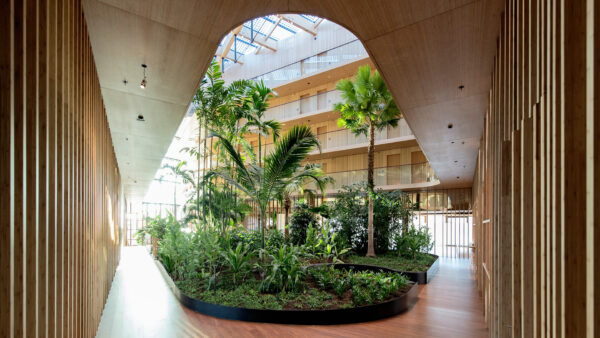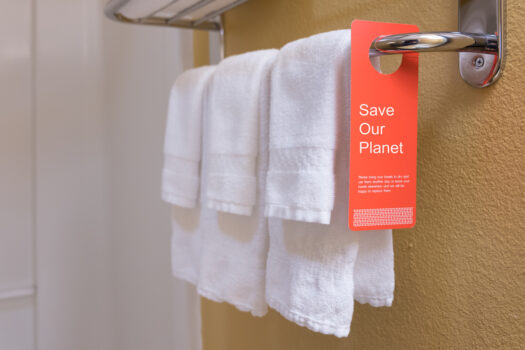The pressure for sustainability is growing now more than ever as travelers are more willing to stay in a sustainable hotel. Sustainability is increasingly being recognized as the key to a profitable organization in the twenty-first century, and it has emerged as the top interest for the hospitality industry. The pandemic forced hotels to change how they operated, pushing safety to the top of the list of considerations for the sector while also offsetting a growing trend toward more environmentally friendly building practices. Nonetheless, hotel operators would be smart to prioritize sustainability in 2022 and 2023.
Regardless of the size or location, a hotel can attract more visitors and save money over the long haul by reducing its environmental impact. Indeed, many people’s daily routines at home have also undergone significant changes. Many people navigate their lives by consuming mindfully, thinking sustainably, and behaving environmentally responsibly.
For any hotel that still intends to be the first choice for its clients, a sustainable hotel concept is a requirement. It makes perfect sense to convert the enterprise to a sustainable framework and communicate this because hotel establishments that incorporate environmentally friendly practices and policies into their daily operations will stay productive and attract eco-conscious visitors due to their support for environmental preservation.
WHAT IS A SUSTAINABLE HOTEL?
The hotel industry is not an exception to the growing trend of sustainability or social conscience in both the public and private sectors. But what exactly does this term imply? Sustainability can be viewed as the capacity of natural ecosystems to sustain life and provide resources for current and future generations.
“A sustainable hotel is a hotel that takes into consideration the environmental, social, and cultural principles in its operations,” said Jigar “Jay” Desai, Senior Vice President of the Tucson Market at NewGen Advisory.
Your hotel will always have an ecological footprint, and as awareness of and worries about climate change and global warming increase, the problem will only worsen. To be sustainable, hotel owners must consider implementing eco-friendly hotel practices. Such issues to be covered include:
- Waste management
- Water use
- Energy efficiency
Again, the good news is that going green will benefit both your bottom line and your reputation, as many sustainable practices call for streamlining processes and increasing productivity.
WHAT PROPERTIES DEFINE A HOTEL AS SUSTAINABLE?
Sustainability implies not only profitability, but also sound business judgment. According to research, a growing number of consumers are prepared to reward enterprises that they perceive as sustainable by using their goods and services. “A sustainable hotel,” according to Desai, “considers the energy, water, waste, materials, emissions, and hazardous products used in a hotel’s operations.”

To be considered a sustainable hotel, it must have at least one of the following practices or features:
- Practicing social and natural respect for the environment. This entails avoiding contamination and observing local customs.
- Organic materials are used on items such as towels and bedsheets.
- Championing the consumption of locally produced and environmentally friendly food.
- Using renewable energies for the majority of its energy supply.
- Observing the bioclimatic construction guidelines, which aim to cut down on the use of heating and cooling systems to a minimum.
- Having been designed with a few environmental, social, and cultural principles in mind.
- Supporting local businesses while aiding in the development of the community.
- Using low-energy lighting and water-saving systems.
Employing environmentally friendly methodologies in maintenance, services, and supply chains helps a sustainable hotel lessen its impact on the environment. Using environmentally friendly materials and lowering energy and water usage are a few examples of possible measures. Hotels may also streamline operations to improve efficiency using systems or hotel automation software.
HOTEL SUSTAINABILITY TRENDS THAT ARE IMPORTANT
There are several sustainable hotel practices you can try when it comes to sustainability in the hospitality industry. “Some examples of a sustainable hotel include using soap dispensers instead of bar soap to cut waste and plastics entering the environment,” Jay Desai explained. “Solar panels generate energy to power the hotel’s electricity and HVAC. Water harvesting systems that can be used for plants/irrigation are used. Using EV chargers at the hotel provides guests with extra amenities.”
Other suggestions for avoiding common and often costly mistakes when developing your hotel’s sustainability strategies include:
1. RECYCLED MATERIAL
To encourage guests to dispose of their waste responsibly, reduce the number of trash cans at your venue while enhancing the availability of recycling options. Make recycling simple for guests by clearly labeling and placing recyclable bins for paper, tin cans, and plastic containers.
2. INVEST IN ENERGY EFFICIENT TRENDS
Industries are increasingly using renewable energy sources as an alternative to traditional fossil fuels. Solar, wind, hydro, and nuclear energy have all made inroads into major industries. Many national governments lend their support to the organizations that work to promote the use of clean energy.
Clean energy is now being used by the hospitality sector as well. Numerous hotels have invested in geothermal energy, biofuels, CHP (Combined Heating and Power), wind farms, and solar heaters. Businesses now have a much more practical option with LEDs for their lighting requirements, which will last longer, be less expensive over time, and produce high-quality lighting throughout the entire building.

3. ECO-FRIENDLY CLEANING
Another area where costs can be controlled and environmentally friendly procedures adopted is housekeeping. Although keeping the hotel pristine is essential to its success, you can achieve this using eco-friendly product. Install refillable soap, shampoo, and conditioner dispensers rather than individual bottles.
Include recyclable silverware, glasses, and mugs. This reduces the number of straws, plastic serving utensils, and paper plates used at your establishment. Additionally, you’ll save money on waste disposal and supply costs. The less waste your hotel generates, the lower the cost of trash removal.
4. SMART CONSTRUCTION
Many hotels today use technology to reduce carbon footprint. Hotels can incorporate elegance and innovative thinking to achieve ground-breaking sustainability goals by utilizing innovative construction, smart technology, and LEED design.
Along with using smart technology, guest rooms are furnished with sustainable materials like furniture and bedding made of natural fibers. Other examples of smart construction include the use of solar power on buildings, the use of green insulation, and tiny electric signals embedded in glass windows or facades.
5. MONITOR YOUR SYSTEMS
Employ a contractor specializing in power quality to audit the hotel’s HVAC system and other electrical devices to ensure that they are using the appropriate amount of power, both when they are in use and when they are not.
6. BUY LOCALLY
Use local producers and food suppliers. It’s a wonderful way to help local farmers and reduce the carbon emissions brought by bringing food in by truck. Menu items should include sustainable options, such as vegetarian and vegan options that require fewer resources to produce than meat.
Starting a sustainability journey may seem overwhelming because it touches on every aspect of hotel life, from housekeeping to operational processes to the restaurant. No matter where your hotel is on its sustainability journey, it can be helpful to draw inspiration and advice from those who have ingrained sustainability right into their very being. By minimizing waste, conserving energy, and lowering their overall carbon footprint, hotels should concentrate on promoting a sustainable environment for their visitors in 2022 and beyond. It’s a great way to lower ongoing operating expenses and contribute to a worthwhile cause in the long run.
NewGen Advisory is dedicated to assisting hotel investors in their endeavors. Team up with us today, and we’ll work together to help you reach your sustainability goals. Contact us today to guarantee that eco-conscious travelers find your hotels and venues.


